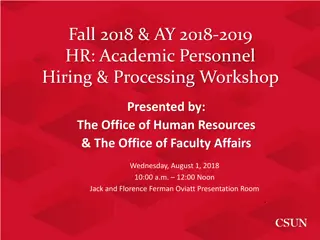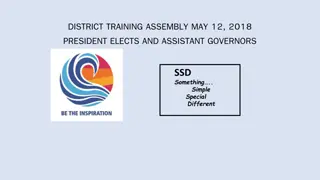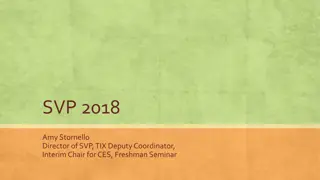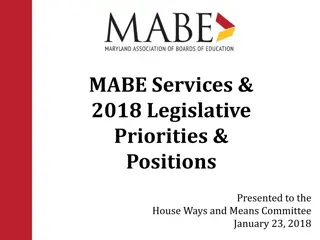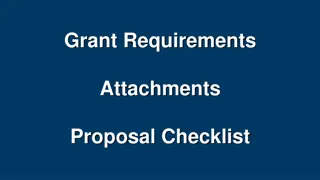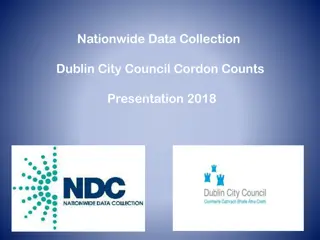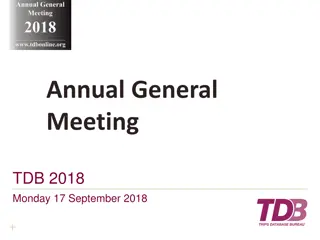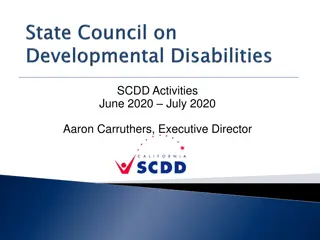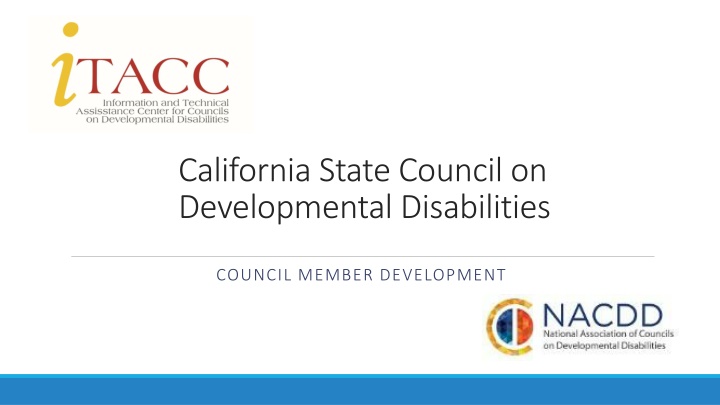
California State Council on Developmental Disabilities
The California State Council on Developmental Disabilities strives to promote community inclusion and self-determination for individuals with developmental disabilities and their families. The council focuses on providing access to essential services and supports that enhance independence and integration in all aspects of community life. Learn about the purpose, responsibilities, and federal policies related to the Developmental Disabilities Act through this informative content.
Uploaded on | 3 Views
Download Presentation

Please find below an Image/Link to download the presentation.
The content on the website is provided AS IS for your information and personal use only. It may not be sold, licensed, or shared on other websites without obtaining consent from the author. If you encounter any issues during the download, it is possible that the publisher has removed the file from their server.
You are allowed to download the files provided on this website for personal or commercial use, subject to the condition that they are used lawfully. All files are the property of their respective owners.
The content on the website is provided AS IS for your information and personal use only. It may not be sold, licensed, or shared on other websites without obtaining consent from the author.
E N D
Presentation Transcript
California State Council on Developmental Disabilities COUNCIL MEMBER DEVELOPMENT
Welcome and Introductions Name Membership role One thing .
Topics and Process Topics DD Act Purpose and highlight on Community Inclusion Member Role and Responsibilities Chair/Member Leader Information Process Questions Activities Check-in s
Value Words Exercise WORK WITH PEOPLE FROM YOUR TABLE AND GENERATE A LIST OF 7 VALUE WORDS ASSOCIATED WITH THE DD COUNCIL AND ITS WORK. POST YOUR LIST OF VALUE WORDS WE LL COME BACK TO THEM IN JUST A BIT!
Purpose What the DD Act intended Assure individuals with developmental disabilities and their families participate in the design of and have access to needed community services, individualized supports, and other forms of assistance that promote self-determination, independence, productivity, and integration and inclusion in all facets of community life, through culturally competent programs authorized under this title
Highlight on Community Inclusion Highlight on Community Inclusion Is the Council required to support, promote, and conduct activities to impact people with developmental disabilities to live and contribute to communities of their choice?
What did Congress find? disability is a natural part of the human experience that does not diminish the right of individuals with developmental disabilities to live independently, to exert control and choice over their own lives, and to fully participate in and contribute to their communities through full integration and inclusion in the economic, political, social, cultural and educational mainstream of United States society;
Federal Policy specific to DD Act It is the policy of the United States that all programs, projects, and activities receiving assistance under this title shall be carried out in a manner consistent with the (following) principles
Principles People with the most significant disabilities are capable of: Self determination Independence Productivity Integration, and Inclusion in all facets of community life But often require the provision of community services, individualized supports and other forms of assistance.
Principles continued People with DD and their families have: Competencies Capabilities Personal goals That should be recognized, supported and encouraged .
Principles continued Assistance should be provided in a manner consistent with the Unique strengths Resources Priorities Concerns Abilities Capabilities (of such individuals)
Principles continued. People with DD and their families are the primary decision makers regarding services, and supports People with DD and their families choose where the person with DD lives (from available options) and play decision making roles in policies and programs that affect the lives of people with DD and their families.
Principles continued Services, supports and other assistance should be provided in a manner that demonstrates: respect for individual dignity, personal preferences, and cultural differences
Principles continued. Specific efforts must be made to ensure that people with DD from racial and ethnic minority backgrounds enjoy increased meaningful opportunities to access and use community services without bias. Recruitment efforts must focus on bringing larger numbers of racial and ethnic minorities into the discipline to address the growing needs of an increasingly diverse population.
Principles continued Efforts undertaken to maintain or expand community-based living options for people with DD should be monitored in order to determine and report the extent of access by people with DD to the living options and the extent of compliance by entities providing the options with quality assurance standards.
Principles continued Families of children with DD need to have access to and use of public transportation to be independent and directly contribute to and participate in all facets of community life. People with DD need to have access to and use of recreational, leisure, and social opportunities in the most integrated settings to enrich their participation in community life.
Attain Capable Competent personal goals Primary decision makers Respect Dignity Meaningful opportunities Enriched participation Contribute DD Act value words Independence
SCDD Mission The Council advocates, promotes and implements policies and practices that achieve self-determination, independence, productivity and inclusion in all aspects of community life for Californians with developmental disabilities and their families.
The Developmental Disabilities Assistance and BILL OF RIGHTS Act THE DEVELOPMENTAL DISABILITIES ASSISTANCE AND BILL OF RIGHTS ACT OF 2000. 42 USC 15001 (2000). PUBLIC LAW 106-402
Among the goals of nationCongress include a goal of providing individuals with developmental disabilities with the information, skills, opportunities and support to make informed choices and decisions about their lives; live in homes and communities where people with developmental disabilities can exercise their full rights and responsibilities as citizens.
Goal continued pursue meaningful and productive lives; contribute to their families, communities, and States and the Nation; have interdependent friendships and relationships with other persons; live free of abuse, neglect, financial and sexual exploitation, and violations of their legal and human rights.
Goal continued achieve full integration and inclusion into society, in an individualized manner, consistent with the unique strengths, resources, priorities, concerns, abilities and capabilities of each individuals; ..there is a need to evaluate the access to community living options by people with developmental disabilities and the effects of those options on people with developmental disabilities.
Role Position Within an Organization Responsibilities Duties of the Position Conduct Responsibilities of the Membership
Highlight Council Member Conduct Are Council members required to conduct themselves in a particular manner? Governor appointees are public officials Generally speaking, a public official is someone in a position of official authority that is conferred by a state (appointed or elected); Three primary duties Duty of Care Duty of Loyalty Duty of Obedience
Leadership characteristics activity WORKING WITH PEOPLE AT YOUR TABLE IDENTIFY 6 CHARACTERISTICS OF EFFECTIVE LEADERS
The Chair and Committee Chairs Responsibility to the Membership and Committee Fair Focused Well-informed Meeting management leader and facilitator Conduct addresses issues regarding confidentiality, conflict of interest, and relevant policies
Fostering an Engaged Council ROLE PEER RELATIONSHIPS MEETINGS PROCESS FOR DELIBERATION
Role of the Council Chair and Committee Chair Roles with the Council membership/committee membership Engage Council members to show a commitment to the Council s mission. Convey responsibility, pride and value in the work of the Council. Celebrate the hard work and achievements of individual Council members, Committee members, and the Council as a whole. Promote outstanding Council member development and governance practices. Roles with the Organization Show an understanding of and passion for the mission, values, and work of the Council. Uphold legal and ethical standards of conduct. Ensure Council members and management (including the Council Chair and Executive Director) speak with one voice in the community. Support open communication, compliance, and accountability for the Council s operations.
Peer Relationships Chair and Committee Chair responsibility to facilitate and foster engagement Dependent on a Chairperson s ability to build strong peer relationships among Council or committee members and a strong partnership with the Executive Director. Strong relationships and partnerships are characterized by: Mutual respect, trust, and support Reciprocal communications Mission-driven shared purpose
Meetings Chair is responsible for facilitating Council meetings. Committee Chairs are responsible for facilitating committee meetings. It is not recommended a Chair delegate facilitation responsibilities to the ED or Committee Chair delegate facilitation responsibilities to a Council staff liaison. The role of the ED or other staff should be to introduce pertinent Council issues and contribute to discussions when appropriate The Chair, as leader of the Council, and Committee Chair as leader of the committee, is uniquely positioned to lead meetings and facilitate discussions. Approach facilitation responsibilities seriously Get training, either formal or informal Prepare well in advance to ensure meetings run smoothly.
Process for Deliberation 4 Step Process 1) Explain the item(s) to be discussed 2) Identify what needs to be accomplished 3) Lead the discussion 4) Search for solutions and options for action
Council Chair and Executive Director Partnership DIFFERENCE BETWEEN GOVERNANCE AND MANAGEMENT PERSPECTIVES AND ACTIONS TO SUPPORT THE ED AND COUNCIL SHARED TASKS
The Importance of the Partnership The Council Chair s partnership with the ED is the most important relationship he or she will have. It is more difficult to achieve goals if the Council s two key leaders are not working collaboratively and fail to develop a culture of mutual respect and trust. The partnership between the Council Chair and the Executive Director serves as the face of the organization, making it worthy of an investment in time. When strong, it can propel a Council toward greatness.
Governance refers to oversight and decision-making related to strategic direction, financial planning, and bylaws- the set of core policies that outline the Council s purpose, values, and structure. Governance decisions should provide guidelines for management. Management refers to the routine decisions and administrative work related to the daily operations of the Council program. Management decisions should support or implement goals and values defined by the Council) and documents (such as the bylaws). Governance vs. Management: What is the difference?
Perspectives Council Chair leadership no micro-managing Executive Director no micro-governing Chair Governance and Council member focused Executive Director Management and Staff focused
Reciprocal (same on both sides) communication Mutual respect, trust, and support Focus on Shared Tasks All tasks accomplished for the good of the Council Share purpose and mission driven
Council Staff Interaction What Is Appropriate? PRIMARY ROLES OF THE COUNCIL, CHAIR, ED AND OTHER STAFF APPROPRIATE COUNCIL-STAFF INTERACTIONS
Primary Roles Direction Oversight Resources The Council has three key roles The staff helps the Executive Director more efficiently implement the directives set by the Council. Primary role of staff The Council s duties center on its monitoring role The ED is responsible for making things happen with the help of the rest of the staff
Council Staff Interactions FAQs Do staff attend Council meetings, and if so, how do they participate? What is an acceptable way to involve staff on Council committees? How do staff members contribute to the Council s work between meetings? Is it appropriate for staff members to take their grievances to the Council? Is it appropriate for Council members to assign tasks to staff?
Wrap-up Evaluation Questions, comments after this meeting? Contact: Sheryl Matney smatney@nacdd.org 202-506-5813, extension 148

